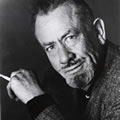Inside the Author's Journal

"It is a strange feeling to be taking people who are close to me apart and putting them on paper. But I see no reason why I should not. They are mine and I can do what I like with them."
— John Steinbeck, Journal of a Novel
A Labor of Love— John Steinbeck, Journal of a Novel
For years, Steinbeck had wanted to write about his mother's family, the Hamiltons, and the Salinas Valley. Critics (and his publisher) were anxiously awaiting another Grapes of Wrath, but Steinbeck would not be rushed. The story he wanted to tell was as much fiction as it was his family's biography. Steinbeck not only told his family's stories, he also wrote himself into East of Eden as a narrator and character. From the beginning, Steinbeck knew that his voice would be more apparent in this book than in any other because he wanted it to contain everything he remembered to be true. He also wanted to stress the writer's roles as the creator of the fictive voice. Steinbeck knew he would be a defining presence in this story and not "for one moment pretend not to be."
Pencil Nubs and Cigarettes
Over the course of one year, he wrote East of Eden in pencil in a blank book. The right-hand pages contained the novel; the left-hand pages were dated letters to Steinbeck's long-time editor and friend, Pascal 'Pat' Covici. After Steinbeck's death, these letters were published in Journal of a Novel: The East of Eden Letters. As he wrote, he traded smoking cigarettes for a pipe, and noted his perennial smoker's cough started to subside.
Better than a Psychologist's Couch
Steinbeck began writing East of Eden after suffering two significant losses: the death of Edward Ricketts—his best friend, known as "Doc" in his Cannery Row books and the separation and divorce from his second wife, Gwyn. By the time he started writing East of Eden from his new home in New York City, he had married his third and last wife, Elaine, and was struggling to be a part of his two small sons' lives. "The last few years have been painful," he wrote in Journal of a Novel. "I don't know whether they have hurt me permanently or not. Certainly they have changed me. I would have been stone if they had not." Looking back on the year that he worked on the book, Elaine said that his work on the novel affected him deeply. It was perhaps the last stage in putting himself back together after the years that had torn him apart.
Sources:
- As compiled by Pauline Pearson, www.steinbeck.org
- Journal of a Novel: The East of Eden Letters by John Steinbeck (The Viking Press, Inc.,1969; Penguin Books, 1990)



